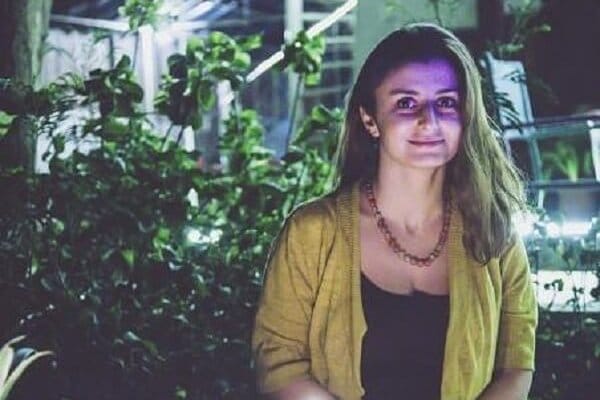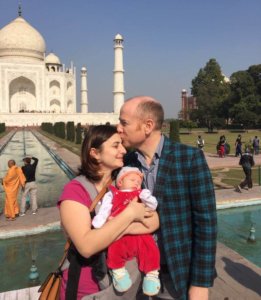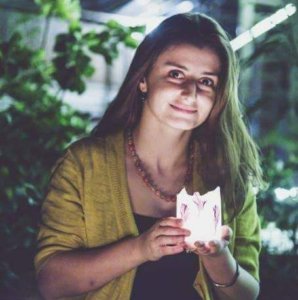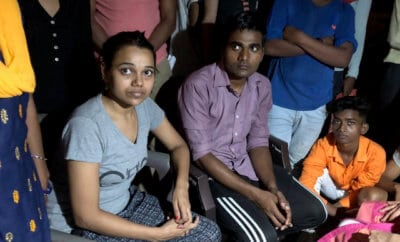Expats
Expat Voice: On the Light Side

"I learnt to live in harmony with nature in India," says Delhi-based Armenian national Mane Voskerchyan.
Mane Voskerchyan came to Delhi from Armenia in 2012 to pursue an internship at AIESEC, the non-profit youth organization. She interned with three companies in India as an international manager before moving to the United States in 2014.
“After working in the United States for a year, I moved back to India because I wanted to start my own business,” Voskerchyan tells Little India. “I was familiar with the market in India. It had great potential and I had good friends and connections in Delhi.”
Voskerchyan, 28, lives with her French partner Jean Marc Dameron, whom she met at the India Art Fair in Delhi. The couple, who run a handmade candles business, recently had a baby girl.
Voskerchyan talks about her interesting first day in the “city of tanks and gates,” the natural beauty of India, the significance of Holi and more:
At least the moon is the same!
When I arrived in India, I reached the house that AIESEC provided me with. There was a Japanese girl in bed with high fever. Every hour, someone would go inside to check if she was alive because she wasn’t moving at all. My Brazilian roommate was in hospital. A Kenyan and a Japanese guy also lived in the same house.
In the morning, the Japanese man took me to the market in Kailash Colony. In Armenia, we consume a lot of cheese. I could not find anything familiar to me in the store and thought of buying some bread, cheese and ham so that I could make a sandwich and be good for the day. I asked the shopkeeper if he had cheese and bread. He said no. I called my friend, crying, and said that the market here does not have cheese or bread. What am I going to eat?
Later in the evening, I had to meet my friend at Old Fort for a light show. There were a lot of mosquitoes so I kept scratching my leg. My friends asked me to stop as they thought I was trying to get attention. On our way back home, they saw my legs, which were all red. I also fell sick.
That’s when I just happened to look at the sky and saw the moon and exclaimed, “Oh my god! The moon is the same.”
That was my first day in India. My friends still make fun of me for saying that.

Mane Voskerchyan and Jean Marc Dameron
Fragrance of Armenia
My partner and I started Natura Morta Candles with the aim to encourage people to appreciate nature and its gifts.
We collect flowers from the mountains in Armenia. We then dry the flowers and bring them to India to make the candles. All the candles are handmade and one-of-a-kind pieces. We do not use any chemicals in the process. We sell them in India, Armenia and Japan.
I learnt to live in harmony with nature in India. I realized I wanted to have an impact on people’s lives after I moved here. Through my work, I try to encourage people to value themselves, because they fail to embrace their identity. If you look at trees, they are never the same and that is their beauty. You never say a tree is ugly. Then why are you so critical of yourself?
City of tanks and gates
I was surprised to see gates separating one colony from the others. If we would reach our house beyond 9 pm, we had to enter from the back gate as only one gate would remain open. We had to give our numbers and tell them which house we were going to otherwise the car wouldn’t be allowed to enter. I found it very weird.
For me, seeing tanks on the rooftops of buildings was very new because the rooftops in my home country don’t look like that. We don’t have gates or tanks on the rooftops of homes in Armenia. I call Delhi a “City of Tanks and Gates.”

However, the parks here are beautiful. There are so many different kinds of trees. When my parents came here, I took them to the parks here. I have two dogs so I take them there for walks. Even when you go to the zoo here, each tree has a name. If I ever go back to Armenia, I will miss the parks the most.
A stinky affair
A few years ago, we went to a few places in Rajasthan for a short trip. We stopped in Jodhpur for a night as we had to take a train back to Delhi the next day. We could not spend a lot of money as we were interns so we stayed at a low-cost hotel.
We thought we would take a shower before sleeping. I went in first, took a shower and came back. Then, one of my friends went in to brush her teeth only to come out and complain about the water being bad. There was also a terrible stink in the washroom. We asked another friend who had used the toilet. “I swear I did nothing,” she said. We opened the windows in the washroom but the smell just wouldn’t go.
Later, we realized that we had taken a shower with stinky water. We complained about it to the hotel authorities, who then provided us with clean water. We washed our hair with shampoo but the smell wouldn’t go. In the end, we had to put shampoo in our hair, tie it up and sleep the entire night with it to get rid of the smell.
It was quite an experience. We laugh when we talk about it now. But at that point of time, we freaked out.
Holi – Giving a second chance
I first played Holi with my Indian friends in Armenia. When I asked them what it meant, this is what they told me:
‘When you happen to see the face of a person you hate or are angry with, you instantly remember the reason behind the hate. India has a caste system in place. When you see someone of a lower caste, you tend to avoid talking to them.
On Holi, the faces of people are covered with color, which means you don’t really recognize the person you hate. You don’t know whether the person belongs to your caste. Therefore, you don’t feel any negative emotions because you are too busy enjoying the festival.
The festival is about giving love or equality a second chance. No one is above or below each other. During that time, we are all equal. There is no slave or king. I don’t hate you because I don’t recognize you. I don’t see you. I see the color.’
It made so much sense to me. It’s a beautiful thought.

Mane Voskerchyan
Value of a person’s life
An incident that happened at one of the companies I interned at really came as a shock to me. The company had installed silos (big containers to store grains) in one of the neighboring countries. However, the installation was not done properly due to which the silos collapsed and a laborer died.
I was horrified when I came to know about it. As a sales manager, I started to question the kind of product I was selling and the kind of company I was working for.
Later, I was told that the matter had been settled. I don’t know what happened. I don’t know whether the company paid some compensation to the worker’s family or did something else. But I was told that the matter was settled.
It made me think about the lack of value of a person’s life here.
Unforgettable journey
I have spent a lot of quality time with myself in India. There is so much to see and experience here. India is a part of me now. It is my second home.
What I love about India is that it makes you think out of the box. It’s a country of extremes. It broadened my horizon and made me a very strong person. It’s been an unforgettable journey so far.
The interview has been condensed and edited.
Expat Voice is regular column on expats in India. Email us at expat@littleindia.com to nominate yourself or another expat for the column.




You must be logged in to post a comment Login